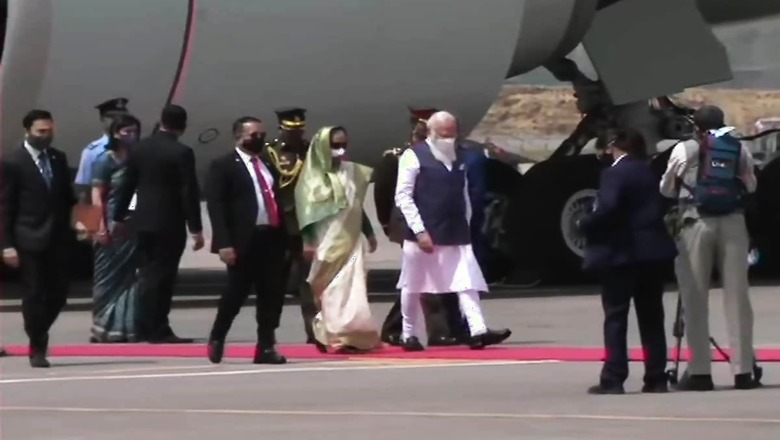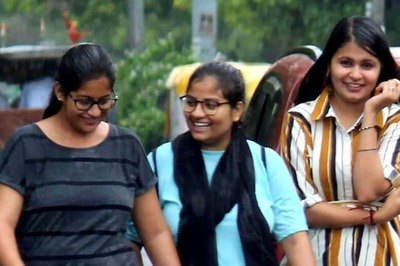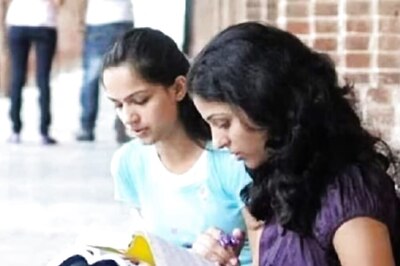
views
March 26 marks the 50th anniversary of the birth of the People’s Republic of Bangladesh. It will be an occasion which Prime Minister Narendra Modi will grace with his presence in Dhaka. India had a vital role to play as a neighbour concerned about the people of then East Pakistan suffering agonizing pain and destruction at the hands of West Pakistan military establishment, which had launched a military operation in order to crush the just demand of the Awami League to be invited to form a democratic government after it won a landslide victory in the general election held in 1970.
Relations between India and Bangladesh have been similar to that of two neighbours who share the same garden. From expectations, concerning issues related to cross-migrations, to aspirations, concerning the rightful share of the waters flowing from the Teesta river and the obligation of reaching a bilateral consensus over the Rohingya crisis, to providing each other access to regional markets through road and sea connectivity. The BJP government in Delhi and Bangladesh Prime Minister Sheikh Hasina’s leadership, however, has demonstrated a sincere will to reach to a win-win arrangement on issues of controversy through friendly negotiations. And, that is exactly what people of both nations are expecting Narendra Modi to achieve during his visit to Dhaka—Consensus.
Prime Minister Narendra Modi’s visit to Bangladesh has sent jitters across the corridors of power in Pakistan. No wonder on March 16, President Arif Alvi held a meeting with Imran Siddiqui, the Pakistani High Commissioner in Dhaka. The president of Pakistan discussed in detail the Indian Prime minister’s visit to Dhaka and asked the High Commissioner to explore all avenues for improving bilateral relations. It was reported in Pakistani national press that Siddiqui had been called from Dhaka to discuss the independence day celebrations in Bangladesh. As a goodwill gesture, Pakistan has removed all visa restrictions for Bangladeshi citizens.
One of the most important issues that must be tackled during Prime Minister Modi’s visit is the share of water that flows through the river Teesta. Time and again, Bangladesh has asked for more fresh water supply from the river during the period between December and May, each year.
The Teesta river starts from Chungthang in Sikkim and flows through West Bengal before entering Bangladesh. Prime Minister Hasina would seek an equitable distribution of Teesta waters with India, probably on the lines of the Ganga Water Treaty of 1996. In which case, India and Bangladesh must find common ground and consider building small dams to hold extra water to cater to the needs of both countries.
Illegal cross-border migration has been another area which has caused unnecessary strain in otherwise-peaceful neighbourly relations. This issue needs to be addressed as it has increased the economic burden on Assam and West Bengal. An estimated 300,000 illegal immigrants cross over into India each year. With the growing menace of Pakistan-sponsored jihadi terrorism, there is a strong likelihood that Pakistan is using this corridor to infiltrate terrorists into India, who then make their way to Kashmir. Hence, serious attempts to implement border controls is crucial and in the interest of both India and Bangladesh. Only by ensuring cross-border travel follows a legal immigration procedure, we can check infiltration of terrorists.
The case for Rohingya refugees, who are currently languishing in Bangladesh, has to be viewed in a non-partisan way. It is a humanitarian crisis that has developed due to racially motivated oppression of a minority community. Hence, it is a regional problem and unless India along with other neighbouring countries put their heads together to share the burden collectively, this menace is not going to go away any time sooner. Therefore, India and Bangladesh have to come to some sort of agreement on how to help Bangladesh deal with the Rohingya refugee crisis. Since this crisis is a regional obligation, hence it must be addressed in the same spirit.
Economic prosperity can play an important role in discouraging our youth from indulging and becoming the cannon fodder for regional terrorism. This is why India, Myanmar, Thailand [IMT] road connectivity project must consider bringing Bangladesh on board. By gaining access to IMT, Bangladesh will become more accessible to regional markets and vice-versa. Bangladesh must be very cautious while cutting deals with China since the latter has proven beyond doubt to be an economic predator. India, on the other hand, can be a more reliable economic partner of the Bangladeshi people.
Prime Minister Modi’s visit on March 26 is full of expectations, aspirations and obligations. It will help lay the foundation for a new level of confidence building that can only be achieved by mutually following the spirit of give and take and by reaching a consensus on every small detail regarding future commitments and obligation.
Read all the Latest News, Breaking News and Coronavirus News here




















Comments
0 comment